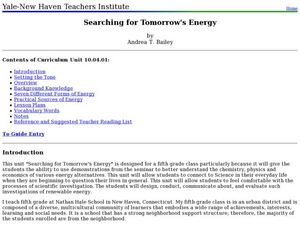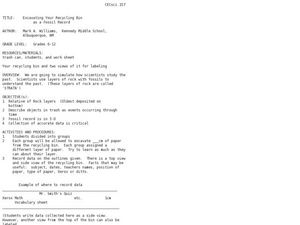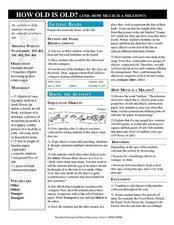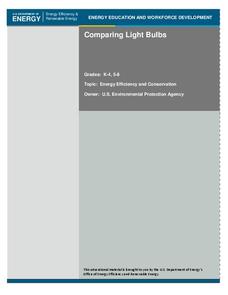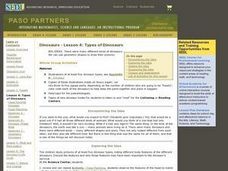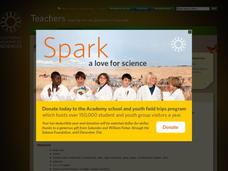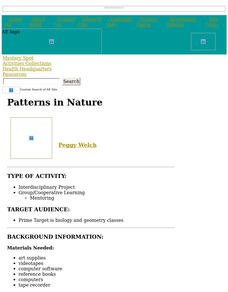Curated OER
Environmental Agents of Mathematics: Mathematics for Change
High schoolers analyze environmental science data using Math. They do research about renewable energy, gather data, create graphs and interpret their findings. Then the group presents their arguments persuasively using their findings to...
California Academy of Science
Optimal and Sustainable: Renewable Energy Revamp
More than 100 cities around the world have shifted from fossil fuels to renewable energy sources. Scholars investigate a city wanting to make this switch, but needs help determining how to make the shift. Groups consider all options,...
Alabama Learning Exchange
We Can Dig It!
Third graders understand the process by which fossils and rocks are excavated. In this fossil and rock instructional activity, 3rd graders explore the job of the paleontologist in a podcast.
Curated OER
Searching for Tomorrow's Energy
Fifth graders investigate energy. In this biology lesson plan, 5th graders will learn about energy, fossil fuels, and renewable and nonrenewable resources. Students will be participating in three lab activities which are described in...
Curated OER
Make a Cast of a Tyrannosaurus rex Fossil
Second graders examine the formation of fossils and list the different types. They make cast model of a dinosaur fossil. They write about conditions that are necessary for fossils to form and create a model of a buried fossil.
Curated OER
Excavating Your Recycling Bin as a Fossil Record
Students explore how scientists examine the past and use rock layers with fossils to understand the past. In this excavation lesson plan students divide into groups and complete an activity.
Curated OER
Math in Science-Radioactive Decay and Half-Life
In this radioactive decay and half-life worksheet, students use given half-lifes to calculate the amount of time it will take for certain amounts of elements to decay. They also find the age of samples and determine how many grams of...
Curated OER
A Closer look at Oil and Energy Consumption
Upper graders analyze basic concepts about the consumption, importation and exportation of the worlds oil production. They create several graphs to organize the data and draw conclusions about the overall use of oil in the world.
Desert Discoveries
How Old is Old? (And, How Much is a Million?)
Here is an interesting instructional activity on how old things are designed for young scientists. In it, learners compile a list of their birthdays, and the class puts them in sequential order from youngest to oldest. Then, they...
Curated OER
Carbon Dating
In this carbon dating worksheet, students read about carbon dating and the estimate the age of a given fossil. This one-page worksheet contains one multi-step problem.
Intel
Energy Innovations
Collaborative groups examine the importance of energy resources on quality of life by researching different energy sources and alternative energy sources through data analysis. They make a comparison of different countries and cultures,...
Curated OER
Comparing Light Bulbs
An average home produces twice as many emissions as an average car. Teach your class how to reduce energy consumption by replacing standard incandescent light bulbs with compact fluorescent light bulbs. Perform an experiment to compare...
Curated OER
Harvesting Oil from the Earth
Fourth graders research sources of fossil fuels especially oil while determining how scientists take core samples from an Earth model. They look at oil consumption and production in the US and throughout the world.
Curated OER
Types of Dinosaurs
Pupils complete puzzles of dinosaurs. They compare each piece of the puzzle to a fossil and simulate a scientist's role in learning about dinosaurs.
Teach Engineering
Win that Bid! Selling Your Power Solution
Power up! Class members research a type of power production using a great resource featuring a real-world problem. Groups select a type of power generation and pretend that they represent an engineering firm for their chosen power type....
Curated OER
ENERGY, Design Competition: Energy Systems of the Future!
Students examine energy, where it comes from and the different fuels that are used. In this energy lesson students design an energy infrastructure using a renewable energy source.
Curated OER
World Without Oil
Students discover the world of fossil fuels and oil shortages. In this world economy instructional activity, students read articles on the Internet discussing the world's dependence on oil and the possibility of an extended oil...
Curated OER
Field Trip at the Mining and Mineral Museum
In this multiplication worksheet, students use the math models in the first two problems to help them multiply and solve the problems. Students solve six multiplication word problems in all.
Edinburgh UNESCO City of Literature Trust
The Lost World
Fans of Sherlock Holmes may be surprised to learn that in addition to stories of the famous deductionist, Sir Arthur Conan Doyle is also the creator of Professor Challenger. An irascible, unpredictable scientist, Challenger was featured...
NASA
The Big Climate Change Experiment Lesson 3: Climate Change Lines of Evidence
Consider the preponderance of evidence when making a verdict. The third of five lessons in Unit 1: The Big Climate Change Experiment focuses on the evidence for climate change. Learners study graphs, diagrams, and pictures regarding...
Curated OER
How Big is a Dinosaur?
Fourth graders create enlarged replica of a stegosaurus drawing, using a grid to practice coordinates.
California Academy of Science
Greening Your Middle School
Middle schoolers redesign their school to make it more energy efficient, and create a model of their design. Learners get together in groups of 5, and they take on the task of making their school more energy efficient. To do this, they...
Curated OER
Patterns in Nature
Research patterns in nature which illustrate biological and mathematical concepts. Your class will discover and explore aspects of fractals, Fibonaccis numbers, whale and butterfly migration patterns, whale identification, flower...
Curated OER
A Day in the Life of Bottled Water
Students research natural resources. In this environmental lesson, students define what a natural resource is and explore the life of a single-use water bottle. Students create a waste-reduction plan.





